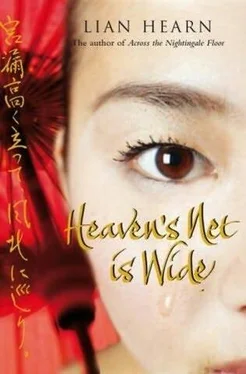The passing of the young woman whom no one had particularly liked plunged the whole household into deepest sorrow. The deaths were trivial-a woman, a girl child-compared to the losses already sustained, yet they inspired almost inconsolable grief. Maybe it was felt that the child had promised a new life, a new start; and now even this small comfort had been denied. Maybe his own family began to believe that the house of Otori Shigeru was cursed.
Shigeru’s grief, compounded as it was by remorse and regret, was the heaviest and most intractable. For several weeks he did not leave the house, except to attend the necessary ceremonies. He drank no wine and ate very little and spent long hours in silent meditation, recalling everything about his wife and the distorted love they had crafted from their marriage. He remembered with shame how he had wished for her death; he had wanted to remove her from his life as one would slap a mosquito: she had been an irritation to him; more, they had hated each other, but they had lain together to make the child that had killed her. They had both been forced down this path: they were husband and wife; their marriage had been designed to produce legitimate children. No one could blame him for giving his wife a child: it was the function of women to bear children.
However, it was his first experience of the danger and pain of childbirth. He knew how much Moe had feared it: though he had been kept from the room, he could not remain unaware of her terror and agony. It amazed and saddened him that women should endure such things: they carried the full result of men’s desire for their bodies; they went to the edge of the world and brought back sons and daughters. And often they did not come back but were pulled, struggling vainly to live, into the darkness, their young, fragile bodies torn apart.
He dreamed of his daughter often, once most vividly of her body in the earth: as spring warmed the cold limbs, pale green plants sprouted from them like young ferns.
Both Akane and Moe had been given to him. Akane he had asked for and got; Moe had been supplied. And now both of them were dead, at just over twenty years old. He thought often about all that Akane had taught him; he wished he had told her that he loved her, that he had let his love for her flower instead of denying it; he wished he had loved his wife, that she had given herself to him willingly and ardently because she loved him. Maybe if they had lived… but they were both gone. He would never see either of them again.
Then his grief would be intensified by longing. After a few weeks, Chiyo, with her usual practicality, arranged for one or another of the maids to linger after they had spread out the bedding, but Shigeru could not bring himself to touch them, telling himself he would never sleep with a woman again.
SPRING CAME LATE but with all the more intensity. The southerly breezes had never been so welcomed for their soft warmth; the sky had never seemed so deeply blue; nor had the new leaves ever been such a brilliant green against it. As the days lengthened, Shigeru mastered his grief, realizing that even though he no longer had any definable role in the clan, he still had a part to plan in its recovery. If he could reshape his life, then so could the Otori clan.
In his time of meditation, he had thought much about his future. He would never give up the intention to confront and kill Sadamu, avenge his father’s death and his clan’s defeat; but in order to achieve this, he knew he must keep it completely hidden. He would make the world think he had genuinely retired, that he was no more than a farmer; he would be innocuous and blameless, and he would wait patiently for as long as he had to, hoping and praying that some opportunity would present itself.
He began practicing this role at home. He dispensed with all formality in the house, somewhat to his mother’s displeasure, took to wearing old, simple clothes, and concerned himself with the development of the garden and of his mother’s estate. He talked to anyone who would listen about experimental farming, when the rains would come, how best to deter caterpillars, moths, and locusts; such work was patently necessary, for the whole country had suffered the previous winter and food stores were almost completely depleted. It did not escape notice that while Shigeru was concerning himself with restoring the land in order that the people might be fed, Shoichi and Masahiro were living in luxury in the castle, expanding and redecorating the residence and making no concessions in their demands for taxation. Craftsmen and painters worked with gold leaf, ebony, and mother-of-pearl while five hundred people died in a week on the streets of Hagi.
Of course, it was a great relief to Sadamu,” Kikuta Kotaro remarked to Muto Kenji. It was over a year since the Battle of Yaegahara and the Tribe Masters had met by prior arrangement in the port town of Hofu, now ceded to the former Otori vassal, the traitor Noguchi. “If Shigeru had had a son, followed by other healthy children, it would have added considerably to Sadamu’s anxieties. Or so it was reported to me in Inuyama.”
Shizuka poured more wine into the bowls and the two men drank deeply. They were both her uncles, Kotaro on her mother’s side, Kenji on her father’s. She listened carefully to the conversation, hiding her feelings, which were complex toward Lord Shigeru. She had never been able to completely forgive herself for her betrayal of him. She felt a stab of pity for him now, wondering if he grieved for his wife’s death; he must surely regret that of his child, even if it was not a son. She thought with a sense of pride of her own son, now six months old, a robust and precocious child, the image of his father, Arai Daiichi. He was sleeping in another room, but she could hardly bear to let him out of her sight, and her pride was mixed with an anxiousness for him that made her breasts tingle and the milk start to flow.
She was half ashamed of her sentiments, she who had always been praised for her ruthlessness and lack of emotion, so valued by the Tribe. She pressed her arms across her chest, hoping the milk would not stain or smell, knowing that both the men in the room would catch the change in her scent.
Indeed, Kenji glanced at her in his amused, sardonic way as Kotaro continued, “But the possibility of future sons has persuaded Sadamu that he made a mistake last year not insisting on Shigeru’s death. He has become even more obsessed by him. Only Shigeru’s death will free him and give him peace.”
“Why did he spare him before?” Shizuka asked. None of them were confidants to Lord Iida, but Kotaro lived in Inuyama, had his own spies there, and dealt with Iida’s retainers, Ando and Abe. He knew the warlord’s thoughts and intentions better than any of them.
“He had some curious idea that he was acting with honor. His vanity was undermined by the fact that he won the battle only through treachery and that Shigeru had saved his life two years earlier in the underground caverns. He thought he was canceling a debt.”
“It is as impossible for Sadamu to act with honor as it is for Shigeru to act with dishonor,” Kenji said and laughed as though he were joking.
“That’s what many are saying,” Kotaro agreed, “though not within earshot of the Tohan, if they value their tongues and ears.” He laughed, too, and went on, watching Kenji’s face closely. “But I’ve received a request, though in fact it was not put quite that delicately, from Ando, for Shigeru to be removed, before the end of the year.”
Kenji gestured to Shizuka to fill his bowl and drank before replying. The three of them were sitting in the back room of a merchant’s house; at the end of the room was a small veranda and beyond that an unpaved yard. Someone had placed a few pots of sacred bamboo and silver leaf around the edge of the veranda, but the yard was filled with pallets, boxes, and baskets. Near the gate two packhorses and some porters were waiting patiently to be loaded up. From beyond the walls came the sounds of the port city. The rhythm of life in Hofu followed the winds and the tides; it was midday; the high tide and the sudden change in the direction of the wind had brought a flurry of activity that masked Kenji’s long silence.
Читать дальше












